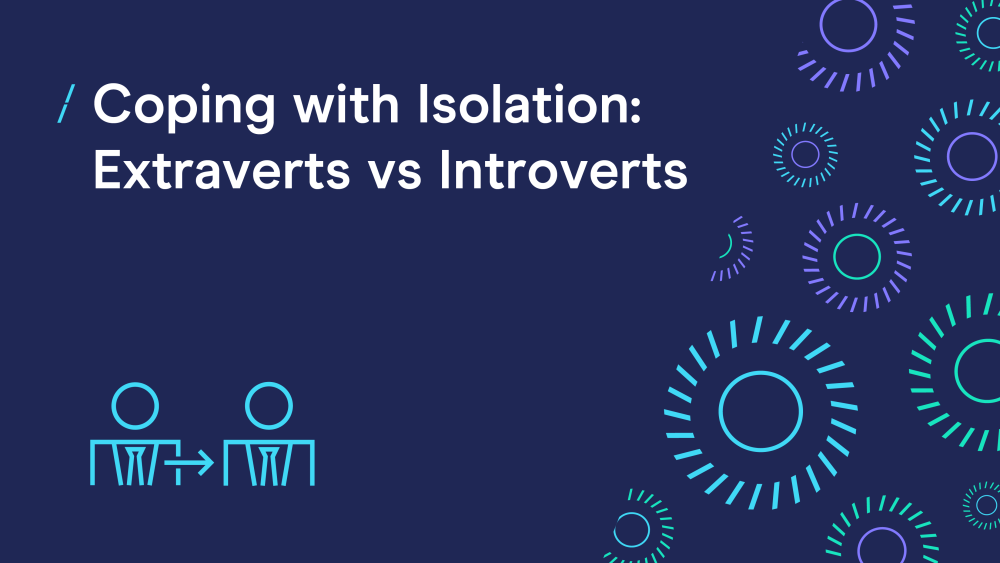Coping with Isolation: Extraverts vs Introverts
01 May 2020

‘Extravert’ and ‘introvert’ are commonly used labels, but what do they really mean – and how do they influence our responses to social distancing? In this latest blog supplied by our B2B Council, Bianca Indipendente – Psychosociologist, Innovation, and Organisation Consultant – shares her research and expertise.
Popularised by Carl Jung in the early 20th century, the terms ‘extravert’ and ‘introvert’ are often misattributed in modern-day society, with many defining extraverts as simply being the ‘life of the party’ and introverts as ‘socially awkward’.
Did you know that the extraversion scale is actually related to how an individual feels energised?
Simply put, this means that a person who feels energised by being around other people would score highly on the extraversion scale, and vice versa.
According to the famous psychologist Hans Eysenck, extraverted individuals have a lower basic arousal level, meaning that they require a higher level of social interaction and new experiences to feel sufficiently mentally stimulated. Introverts, however, have a higher basic arousal level and are naturally over-stimulated, so therefore may not respond as well to such highly social environments.
As an important dimension in explaining human behaviour, the extraversion scale is one of the Big Five (OCEAN) dimensions used to characterise the personality of individuals. At DPL, we use this personality model to learn more about people and their behaviour.
As the coronavirus continues to rapidly spread across the world, governments have pleaded with the public to engage in social distancing and isolation. As this is a new virus, we don’t yet know when these measures will be lifted – with the British Prime Minister, Boris Johnson, suggesting that the measures may be in place for at least ‘12 weeks’.
This, and the uncertainty around how further, stricter measures could impact our everyday lives, has encouraged individuals to turn to social media to share their personal experiences and opinions. To research this further, we collected data from Twitter using our platform Personai, to observe how introverts and extraverts are experiencing social distancing differently.
We found that people with higher extraversion scores are in general, assuming a positive attitude towards social distancing. Their Tweets use an uplifting and humorous ‘tone of voice’ to talk about their personal experiences, and they’re also using the platform as a way to connect with others during the pandemic.
On the other hand, we discovered that introverts are taking a much more critical approach, using Twitter as a means to criticise the government’s lack of response to the pandemic, and as a way to judge people who’re not staying at home and taking social distancing seriously.
Interestingly enough, our Twitter research also found that extraverts generally see social distancing as a novel experience and want to share their tips and tricks for ‘surviving indoors,’ such as doing online salsa classes and cooking new and exciting meals. They also invite others to take positive and responsible action to protect and support society’s most vulnerable during the pandemic.
It comes as no surprise that we found that introverts generally find social distancing a less alien concept and are, in this circumstance, less worried and in need of social interaction – or as one person nicely put it on Twitter: ‘Coronavirus simply underestimates my ability to stay at home and avoid everyone’.
For the time being, the novelty of social-distancing and a good internet connection is helping extraverts to cope with the pandemic, allowing them to share their experiences and feed off the energy of others on social media.
However, as we’ve only just started to implement social distancing in the UK, extraverts may soon have to find more creative coping mechanisms to stay positive throughout the duration of the pandemic.
Social distancing seems to be a less challenging concept for introverts, but to stay positive in the long term, it’s important that they take the time to keep in contact with loved ones and not let this situation take over their exceptional ability to enjoy ‘me time’.
The original article, written by Bianca Indipendente, can be found here.
Other blog posts examining the current situation from a behavioural science perspective include:
- Panic-Buying, Personality Types, and the Coronavirus
- Is Your Personality Type Suited Towards Working from Home?
For more information on the coronavirus, check out the DMA’s Coronavirus: The Daily Digest and Coronavirus: Advice and Help. From important Government updates to support for your business and other valuable resources.

Please login to comment.
Comments